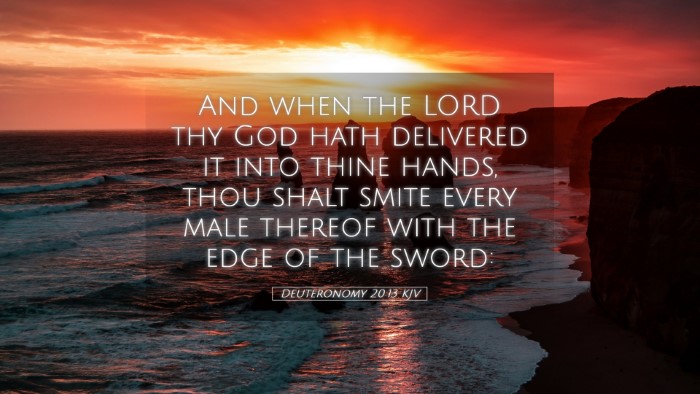Commentary on Deuteronomy 20:13
Deuteronomy 20:13 states:
"And when the LORD your God delivers it into your hands, you shall strike every male in it with the edge of the sword."
This verse reflects God's commands regarding warfare in the context of Israel’s conquest of Canaan. It has generated significant theological and ethical discussion among scholars, pastors, and students alike.
Historical Context
This passage is situated within a larger discourse on Israel's military engagements as they prepare to enter the Promised Land. Under Moses’ leadership, the Israelites are instructed on how to conduct themselves in warfare, illustrating God's sovereignty and judgment over the nations inhabiting Canaan.
Theological Insights
The command to destroy the males in besieged cities denotes a clear and decisive action ordained by God. Commentators like Matthew Henry emphasize that this is part of God's judgment against the sins of those nations:
- Divine Justice: God's instructions are seen as an execution of divine justice against the wickedness of these nations.
- Purity of Israel: This act was intended to preserve the worship and purity of Israel, ensuring they do not adopt the abominable practices of these peoples.
- Fulfillment of Promise: The destruction of these nations is tied to God's covenant promise to Abraham, Isaac, and Jacob, and the land He had sworn to give to their descendants.
Interpretive Challenges
Many modern readers struggle with the ethical implications of such a command. Albert Barnes offers insights that help navigate these concerns:
- Contextual Understanding: Barnes suggests that understanding the broader narrative of the children's disobedience and depravity is crucial in recognizing the severity of God's judgment.
- God's Sovereignty: He posits that God, as the Sovereign of the universe, is within His rights to deal with nations as He sees fit, operating on a scale of divine justice that human beings cannot fully comprehend.
- Judgment vs. Mercy: Barnes also points out that God's commands for destruction are not arbitrary but are rooted in the long-suffering nature of God, who desires repentance rather than judgment.
Practical Applications
For pastors and theologians, this passage serves as a reminder of several key applications:
- God’s Holiness: The commands of the Old Testament reflect the holiness of God and the serious nature of sin, prompting believers to consider their own spiritual state in light of God's standards.
- Covenantal Faithfulness: This verse reinforces the importance of remaining faithful to God’s covenant and avoiding the temptations of surrounding cultures.
- Judgment and Redemption: Pastors can draw parallels from this judgment in the Old Testament to the redemptive work of Christ in the New Testament, who offers salvation from sin.
- The Cost of Sin: The harshness of these commands serves as a sobering reminder of the reality and seriousness of sin, as well as its consequences.
Conclusion
In conclusion, Deuteronomy 20:13 is a challenging verse that encompasses themes of divine justice, mercy, and the seriousness of sin within the context of Israel's history. The insights from public domain commentaries like those of Matthew Henry, Albert Barnes, and Adam Clarke help to elucidate its meaning and provide frameworks through which modern believers can interpret its application in their lives. It calls upon pastors and theologians to inspire a deeper understanding of God's character and His righteous standards, assuring that His judgments always align with His holiness and ultimate purpose.


